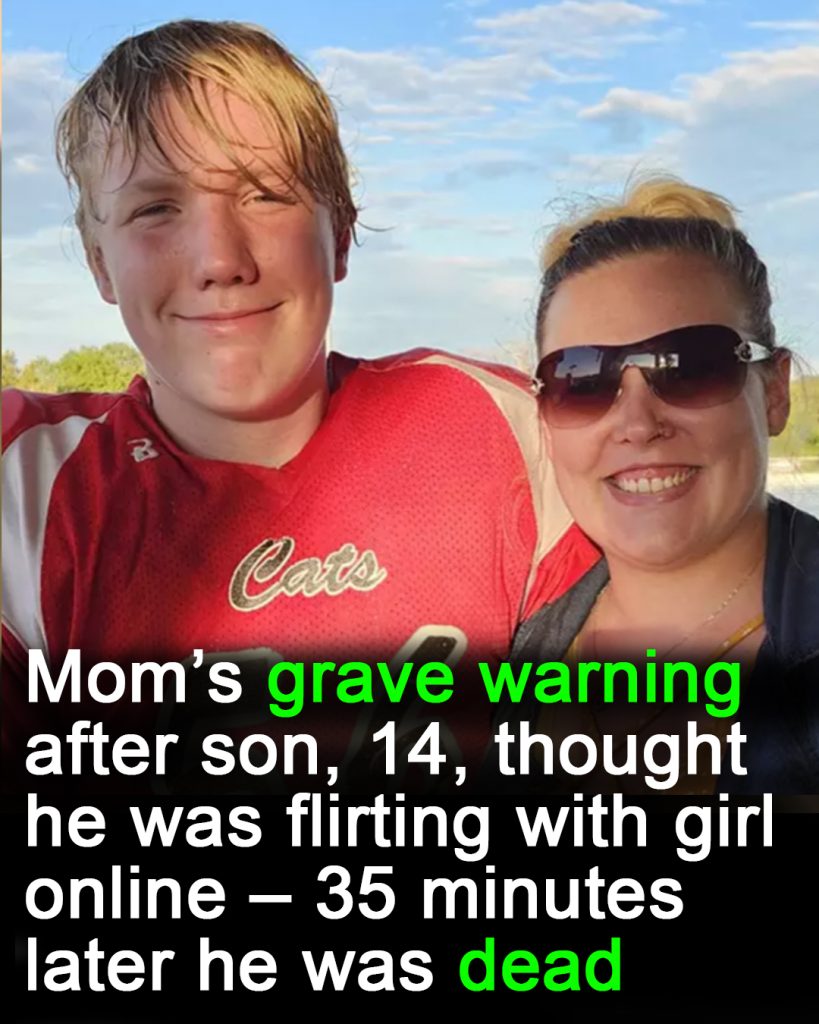A Kansas mother is speaking out after her 14-year-old son took his own life, claiming he was the target of an online “sextortion” scheme that devastated him in less than an hour.
For parents today, the internet presents an ever-growing minefield of worries. Most strive to stay informed about what their children are doing online—what platforms they use, which apps they download, and who they’re communicating with. Some go even further, actively monitoring their child’s digital footprint in hopes of protecting them from harm. Yet even the most vigilant efforts can’t provide a constant shield. The truth is, no parent can be everywhere at once, and the dangers lurking online—from viral dares to professional scammers—are very real.

Morgan, the mother of 14-year-old Caleb Morgan from El Dorado, Kansas, knows this tragedy firsthand. On June 10, Caleb struck up a conversation on TikTok with someone he believed to be a girl his own age. That seemingly innocent interaction moved quickly to Snapchat, where the exchange took a darker turn.
According to Morgan, the person—posing as a 14-year-old girl—shared provocative images and encouraged Caleb to respond in kind. Feeling like he was speaking with a peer, Caleb complied, sending images of himself in return. But things quickly spiraled into something far more sinister.
Shortly after, the “girl” began blackmailing Caleb. She demanded that he send large sums of money, threatening to release his photos if he didn’t pay. Morgan said that this sudden and terrifying pressure completely overwhelmed her son. “They made him feel like his life was over,” she explained, recalling how the situation escalated rapidly.
Panicked and trapped, Caleb saw no way out. He took a gun from his home and ended his life.
It was Caleb’s father who called Morgan with the devastating news. Rushing to the house, Morgan arrived while her son was still breathing.
“When I got there, Caleb was still alive and breathing, but they couldn’t bring him back,” she said. “They stopped trying because nothing was working.”
Her voice filled with pain, she remembered, “He passed away in the house. It was unbearable. I wanted to be with him, but they wouldn’t let me inside. They didn’t want me to see him like that. I was screaming and crying, begging them not to give up on him. I was completely shattered.”
Initially, no one understood why Caleb would take such a drastic and heartbreaking step. His parents were left with nothing but questions and sorrow. It wasn’t until the El Dorado Police Department examined Caleb’s phone that they discovered the devastating truth.
“They went through his TikTok messages,” Morgan said, “and showed me everything. In just 35 minutes, that person stole my boy’s happiness and hope.”
What they found was chilling. The conversations revealed a deliberate attempt to manipulate and control Caleb. At one point, in a desperate attempt to make the demands stop, Caleb even sent a photo of the gun.
According to the FBI, this type of manipulation is known as “sextortion.” It’s a form of blackmail where someone threatens to release sexually explicit images unless the victim provides more content or money.
“Sometimes, the criminal starts by threatening the child outright,” the FBI website states. “They may claim to already have a revealing image or video and threaten to release it unless the child sends more.”
These predators don’t operate by accident. They are calculated, ruthless, and skilled at exploiting their victims’ vulnerabilities. Children and teens—who are often just beginning to explore the complexities of social relationships—can be especially susceptible. They may feel embarrassed, ashamed, or terrified to tell an adult what’s happening, and that silence gives these criminals power.
Caleb, like many teens, didn’t fully understand that he was being preyed upon by someone with malicious intent. What began as a conversation with a “peer” quickly became a nightmare he didn’t know how to escape. And without a safe space to talk about what was happening, Caleb’s fear and shame took over.
Morgan is now speaking out in the hope that other families don’t have to suffer the same fate. She wants parents to understand the very real dangers of online communication and urges them to have open, honest, and judgment-free conversations with their children.
“This can happen to anyone,” she said. “My son was sweet, smart, and trusting. He didn’t deserve this. No child does.”
She hopes her family’s loss can serve as a wake-up call. Too many children are silently navigating overwhelming situations online, afraid to reach out for help. By fostering an environment where kids feel safe to talk, and by educating families about the dangers of sextortion, more lives can be saved.
Experts recommend that parents talk to their children early and often about the risks of sharing images and personal information online. They also advise teaching kids that no matter what happens, they can always come to their parents without fear of punishment or judgment.
“This is not just about keeping kids off social media,” Morgan said. “It’s about giving them the tools and the support they need to protect themselves and speak up when something’s wrong.”
Caleb’s story is heartbreaking. It’s also a sobering reminder of how quickly online manipulation can escalate. What happened to him in just over half an hour had consequences that will last a lifetime for those who loved him.
His family now mourns the loss of a boy who should have had his whole life ahead of him—taken far too soon by someone who saw him not as a child, but as a target.
As investigations continue, Morgan is pushing for greater awareness, stronger protections for kids online, and accountability for predators who exploit the vulnerable.
“I miss him every moment of every day,” she said. “I just hope that sharing his story might save someone else’s child.”





